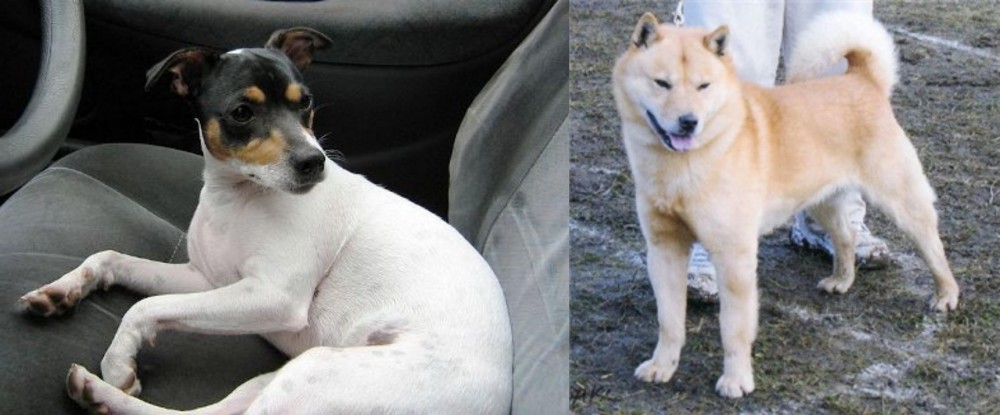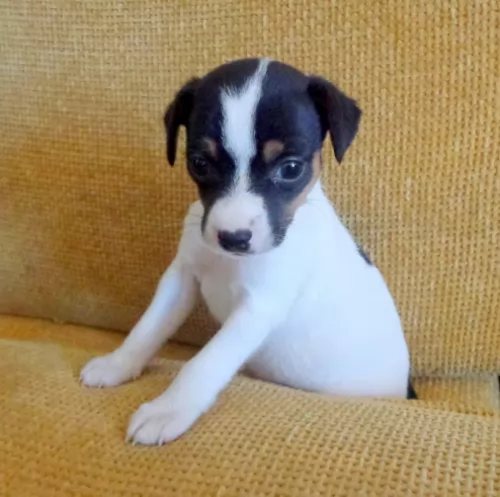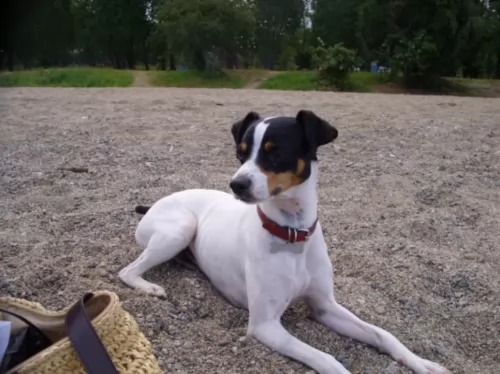 Petzlover
Petzlover Chilean Fox Terrier is originated from Chile but Hokkaido is originated from Japan. Chilean Fox Terrier may grow 11 cm / 4 inches shorter than Hokkaido. Chilean Fox Terrier may weigh 40 kg / 88 pounds lesser than Hokkaido. Both Chilean Fox Terrier and Hokkaido has same life span. Both Chilean Fox Terrier and Hokkaido has almost same litter size. Chilean Fox Terrier requires Low Maintenance. But Hokkaido requires Moderate Maintenance
Chilean Fox Terrier is originated from Chile but Hokkaido is originated from Japan. Chilean Fox Terrier may grow 11 cm / 4 inches shorter than Hokkaido. Chilean Fox Terrier may weigh 40 kg / 88 pounds lesser than Hokkaido. Both Chilean Fox Terrier and Hokkaido has same life span. Both Chilean Fox Terrier and Hokkaido has almost same litter size. Chilean Fox Terrier requires Low Maintenance. But Hokkaido requires Moderate Maintenance
 The Chilean Fox Terrier, developed in Chile, is a dog breed which comes from crossing the British Fox Terrier with some of the local Chilean dogs.
The Chilean Fox Terrier, developed in Chile, is a dog breed which comes from crossing the British Fox Terrier with some of the local Chilean dogs.
The dog is thought to have been developed in the 19th century already, some time between 1790 and 1850.
The dog is known for its skills in catching rats and mice. Known also as the Chilean Rat Terrier, Terrier Chileno or Ratonero, the Chilean Fox Terrier hasn’t achieved formal recognition with any of the leading canine organizations.
 The Hokkaido breed originates in Japan and is also called Ainu-ken, Ainu dog, Seta or Do-ken. The last being its common name in Japan. It is believed that the Hokkaido is descendent from the Japanese Matagi-ken, meaning hunting dog, deer hunting dog or bear hunting dog. It was the Ainu peoples that brought the breed to Tohoku. Many years later the Yayoi people brought in another breed of hunting dogs. These breeds were in isolation for most of their existence and therefore they had little influence on the further development of other breeds.
The Hokkaido breed originates in Japan and is also called Ainu-ken, Ainu dog, Seta or Do-ken. The last being its common name in Japan. It is believed that the Hokkaido is descendent from the Japanese Matagi-ken, meaning hunting dog, deer hunting dog or bear hunting dog. It was the Ainu peoples that brought the breed to Tohoku. Many years later the Yayoi people brought in another breed of hunting dogs. These breeds were in isolation for most of their existence and therefore they had little influence on the further development of other breeds.
The Ainu dog was used in searches as well as hunting and became in 1937 “a rare species in Japan that is protected by law”. At that time the Official Name of the breed was set in place as Hokkaido-Inu. But they are still called Hokkaid0-Ken by most Japanese people.
This is a very rare breed of dog. It is hardly known outside of Japan and in country there are about ten to twelve thousand remaining. Of those about nine hundred to one thousand are registered in Japan every year. It is guessed that less than thirty exist outside Japan.
The Hokkaido breed is the oldest Japanese breed of dogs. Today they are great indoor companions, loyal and friendly. Most people in Japan still call them the Ainu dog.
 The Chilean Fox Terrier looks almost identical to his ancestors. He stands between 30 – 40cm and weighs between 5 to 9kg.
The Chilean Fox Terrier looks almost identical to his ancestors. He stands between 30 – 40cm and weighs between 5 to 9kg.
He is squarely proportioned, he is athletic looking and well muscled with long, slender legs. Many of these dogs are born with naturally short tails, but if not, then the tail is usually docked after the first or second vertebrae. Now that docking is falling out of favor, the breed is losing that distinctive look.
The head of the Chilean Fox Terrier is triangular with the muzzle being somewhat shorter than the Smooth Fox Terrier. The ears of the Chilean Fox Terrier are smallish and high set, being partially erect. The coat of the dog is short and thick and essentially white while the face is usually tan and black.
The Chilean Fox Terrier is loyal with his human family and can fit in well with a family where there are children and other pets.
Training and socialization become necessary for the dog so that he becomes obedient and amicable around his family and with strangers. He isn’t an aggressive dog but he is alert and can make an excellent watch dog.
He is dominant and confident and also intelligent and easily trainable. He is an active dog so he will require exercise every day, whether he lives in the city or in the country.
 The Hokkaido breed is medium in size but very strong in build. Dogs bred outside Japan tend to be smaller. They have wide, deep chests, and long thick coats compared with Japanese dogs from other breeds. It is a double coat of long fur on top and short softer fur underneath for the second coat. Their ears are triangular and small while their eyes have a triangle outline. The double coat could be sesame, white, red, black, black and tan and wolf-gray.
The Hokkaido breed is medium in size but very strong in build. Dogs bred outside Japan tend to be smaller. They have wide, deep chests, and long thick coats compared with Japanese dogs from other breeds. It is a double coat of long fur on top and short softer fur underneath for the second coat. Their ears are triangular and small while their eyes have a triangle outline. The double coat could be sesame, white, red, black, black and tan and wolf-gray.
They are an intelligent breed with an impulsive gait. They are alert, courageous and suspicious. They were used for guarding the city gates. Their skull is flat and broad and the tongue, like the chow chow, is blueish. black. With a black nose and a wedge shaped muzzle, the Hokkaido is a handsome dog. His lips are with black and tight. High set, thick tail over the back or slightly curved to the side.
 The Chilean Fox Terrier is a lively dog with an alert expression. He has become a popular companion dog, being less aggressive than other Terriers.
The Chilean Fox Terrier is a lively dog with an alert expression. He has become a popular companion dog, being less aggressive than other Terriers.
When you treat him well he becomes a loyal friend and forms a strong bond with his human owners. He gets on well with children who have been taught to respect animals, but he tends to become a bit aggressive around other dogs of the same sex.
Socialization and training however can make him much more relaxed around other dogs.
He is an attractive little dog with his short coat, giving the appearance of being well groomed. He can adapt to country- or city life too. He is such an easy dog to keep too so why not choose him as your 4-legged family member? He promises to make the perfect family companion.
 The Chilean Fox Terrier is a healthy breed who doesn’t appear to have any particular health issues. It doesn’t mean that your dog will be free from disease, but it is worth knowing that a quality diet, fresh water and lots of love and attention does enhance longevity in a pet.
The Chilean Fox Terrier is a healthy breed who doesn’t appear to have any particular health issues. It doesn’t mean that your dog will be free from disease, but it is worth knowing that a quality diet, fresh water and lots of love and attention does enhance longevity in a pet.
It is to your benefit to know about one or two common diseases that your dog could get.
You’ll notice your pet’s stomach being swollen. Bloat is a disease which can become dangerous because the stomach can twist. Once this happens, gas can’t escape from the stomach and your pet will want to vomit, he’ll salivate and you’ll notice unusual restless kind of behavior. You need to get him to the vet as soon as possible.
This is also a disease that any dog can develop and can be a complication of another pet disease such as Lyme disease. One of the first signs of kidney disease in dogs is drinking more often than usual and also urinating more often.
He’ll lose his appetite and be lethargic and likely lose weight. Kidney disease is a serious disease and you will need to get your pet to the vet as soon as possible.
 Often breeds that are isolated like the Hokkaido, have a pretty good health history but there are a few serious issues that they face.
Often breeds that are isolated like the Hokkaido, have a pretty good health history but there are a few serious issues that they face.
1/3 of all dogs have it while 2/3 are carriers. This disease is congenital and there is no cure. It affects the sclera, retina and choroid. It can be mild or it can cause blindness.
Affecting joints and cause arthritis and lameness.
Floating kneecap – not as prevalent here as in smaller dogs.
Could be mild or serious. Could require a pacemaker.
Seizures of an unknown origin. Can be treated with medication not cured.
Excessive, uncontrollable urge to drink large amounts of fluid without a stimuli.
 The Chilean Fox Terrier is a low maintenance breed and this means you won’t be having to part with any money on grooming sessions for him. He’ll basically require a brushing twice a week.
The Chilean Fox Terrier is a low maintenance breed and this means you won’t be having to part with any money on grooming sessions for him. He’ll basically require a brushing twice a week.
The Chilean Fox Terrier, as a smaller dog breed, will also require regular dental brushing, as neglecting this can result in dental problems as well as a host of diseases that are associated with gum disease and tooth decay.
Make sure to feed him a quality diet full of vitamins and minerals and ensure he always has fresh, cool water available.
 The puppy needs about 300 -400 calories per day in 3-4 servings per day
The puppy needs about 300 -400 calories per day in 3-4 servings per day
The adult dog needs about 250-350 calories a day to maintain good weight and health. Feed 2-3 times per day.
Strong, stamina
These dogs love exercise and definitely need it. They will get to be anxious or bored if they don’t get enough exercise. A back yard run is fine but remember that the Hokkaido is a jumper and make sure your fence is at least six feet high. They need daily walks even if you have a fenced yard. Martindale collars or harnesses are needed when walking them.
These dogs love games and competitive activities. They are good at hunting and guarding of course. There are other activities they can excel at and enjoy jogging, biking with you, and hiking. In competition they enjoy and are good at agility, flyball, lure coursing, rally, weight pull, dock diving, and obedience. They do not participate in confirmation.